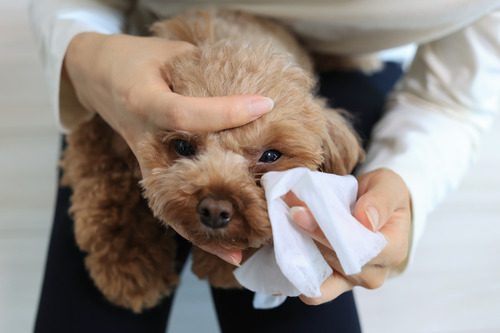If you’ve ever caught your dog waking up with crusty gunk around their eyes, you’ve likely asked yourself: Why do dogs get eye boogers? It’s a normal concern among pet owners, especially when discharge changes in color, consistency, or frequency. While some eye discharge is normal, other signs might point to an underlying issue that requires veterinary care. At Bayshore Veterinary Hospital in Holmdel, NJ, we help pet parents stay informed about what’s normal, what’s not, and when it’s time to schedule an exam. Let’s take a closer look at what causes this common eye concern in dogs.

What Are Dog Eye Boogers Made Of?
The term “eye boogers” refers to any type of discharge that gathers near the corners of your dog’s eyes. This discharge can appear crusty, gooey, watery, or thick, depending on the cause. It’s typically made up of a mix of dried tears, oil, mucus, dust, and other debris. Dogs produce tears to keep their eyes moist and healthy, but when excess tears combine with surrounding particles, they can dry out and form crusts. While occasional eye boogers are part of normal tear drainage, frequent or unusual discharge could indicate a bigger issue.
Normal vs. Abnormal Discharge: What’s the Difference?
Many dogs develop a small amount of eye boogers during the day or after sleep. This is usually harmless and may not require veterinary care. However, certain changes in appearance or frequency can be warning signs.
Normal Eye Discharge
- Light-colored (clear or pale gray)
- Slight crusting at the inner corners of the eyes
- Occasional tearing, especially after sleep or wind exposure
- Doesn’t affect vision or behavior
Signs of Abnormal Eye Boogers
If you’re asking “Why do dogs get eye boogers?” because you’ve noticed a change in your dog’s eye health, look out for:
- Green, yellow, or bloody discharge
- Thick, mucus-like consistency
- Swelling or redness around the eye
- Frequent pawing at the eyes
- Squinting or keeping the eye closed
- Foul odor
Discharge like this often points to an underlying issue that may require veterinary attention.
Common Causes of Dog Eye Boogers
Once you start noticing eye discharge, it’s natural to wonder about the root cause. Several conditions could be contributing to the problem.
Allergies
Just like people, dogs can suffer from seasonal or environmental allergies. Pollen, dust, mold, and household cleaning products can trigger allergic reactions that cause watery eyes and discharge. If your dog’s eye boogers seem more frequent during certain times of the year, allergies may be playing a role.
Conjunctivitis (Pink Eye)
Conjunctivitis refers to inflammation of the conjunctiva, the tissue that lines the eyelid and covers the white of the eye. It’s one of the most common reasons dogs develop abnormal discharge. Symptoms may include red eyes, swelling, and thick, discolored eye boogers. Bacterial, viral, or allergic causes can all lead to conjunctivitis.
Blocked Tear Ducts
When tear ducts become clogged or don’t drain properly, tears can build up and overflow, mixing with debris and forming boogers. Blocked tear ducts may be due to genetics, trauma, infection, or debris lodged in the duct itself.
Breed-Related Issues
Some breeds are more prone to eye discharge than others. Dogs with short muzzles and shallow eye sockets, such as Pugs, Shih Tzus, Bulldogs, and Pekingese, often have trouble with tear drainage. If you own a brachycephalic breed, you may notice persistent eye boogers.
Eye Injuries or Foreign Objects
If a dog gets dust, sand, or other foreign material in their eye, the body will produce tears and mucus to try to flush it out. This protective response often results in noticeable discharge. Scratches or trauma to the eye may also cause irritation and excess boogers.
When Should You Call Your Vet?
While mild eye discharge is often harmless, it’s important to pay attention to changes. Contact your veterinarian at Bayshore Veterinary Hospital in Holmdel if you notice:
- A sudden increase in discharge
- Changes in color or odor
- Redness, swelling, or cloudiness
- Frequent rubbing or scratching of the eye
- Your dog keeping one or both eyes closed
These symptoms can indicate infections, ulcers, or other conditions that should be addressed promptly. To schedule an eye exam with our team at Bayshore Veterinary Hospital, call (732) 671-3110 today. We’ll help determine the cause and provide appropriate care to protect your dog’s eye health.
What Happens During a Veterinary Eye Exam?
If your dog comes in for an eye exam, our team will begin by gathering a thorough history of symptoms. We’ll ask questions about when the discharge started, how it looks, and whether it’s affecting your dog’s behavior or appetite.
During the exam, your veterinarian will:
- Check the eyes for irritation, injury, or infection
- Evaluate tear production and drainage
- Examine the eyelids and surrounding structures
- Use specialized tools to look beneath the eyelids and into the eye itself
In some cases, we may recommend diagnostic testing, such as tear staining tests, fluorescein dye for detecting corneal ulcers, or cytology to check for infection.
Can Eye Boogers Affect Vision?
Mild eye boogers typically don’t interfere with your dog’s ability to see. However, when discharge is caused by a more serious condition, untreated inflammation or infection may impact vision over time. Chronic conjunctivitis, ulcers, or glaucoma are just a few of the conditions that can lead to long-term complications.
If your dog is bumping into furniture, hesitating at stairs, or avoiding bright lights, those may be signs of impaired vision. Don’t ignore these clues. The earlier we detect eye conditions, the better the chance of preserving your dog’s sight and comfort.
Local Support for Dog Eye Health in Holmdel
Asking Why do dogs get eye boogers? is a great first step toward advocating for your pet’s health. While many causes of discharge are harmless, it’s always a good idea to monitor your dog closely and consult with your veterinarian when anything seems off. The team at Bayshore Veterinary Hospital is here to support you with gentle, attentive care for all aspects of your dog’s eye health. If you notice changes in your dog’s eye discharge or have questions about what’s normal, give us a call at (732) 671-3110 to schedule an appointment.
